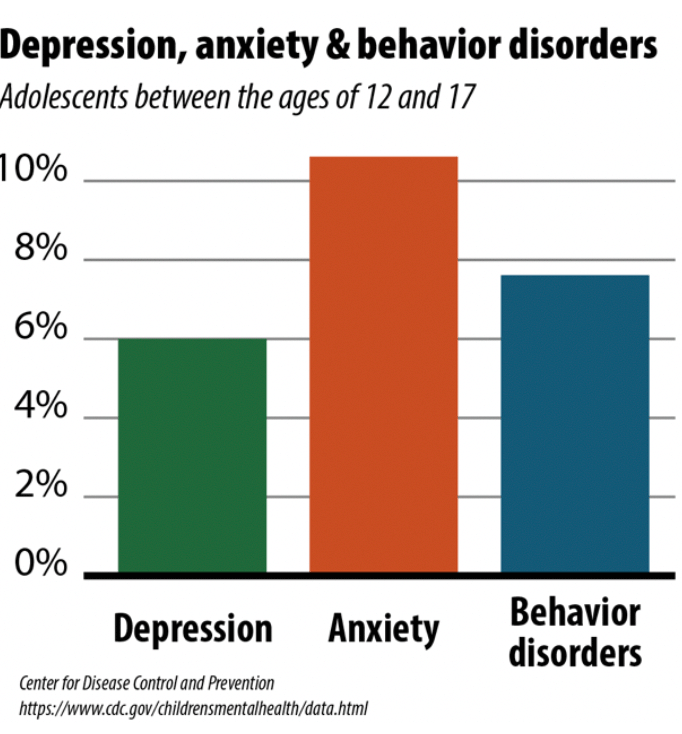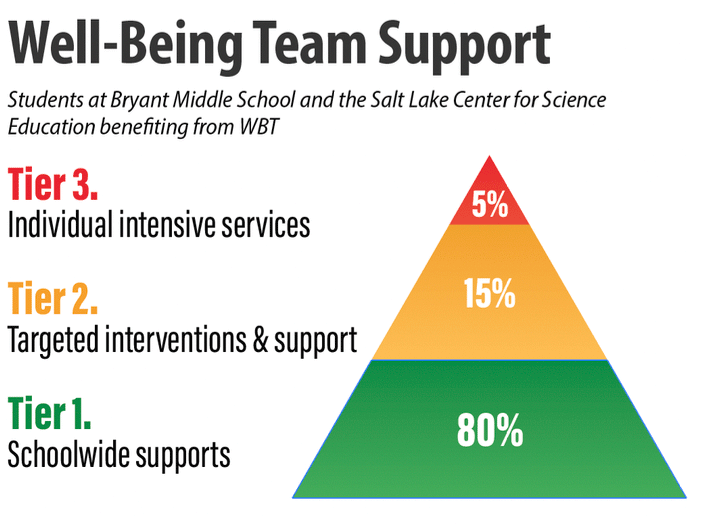College of Education’s Well-Being Team makes a difference at two local secondary schools.
Student mental health is an important concern for all educators. Students with behavior problems and those who display symptoms of mood and emotional disorders are not only suffering, they’re often distracted and not fully engaged in school.
The challenges of adolescence combined with the pressures of school and the classroom can take a toll. Each year, according to the Centers for Disease Control and Prevention (CDC),* a considerable percentage of students display signs of mental health disorders, yet limited school resources keep most students from getting the help they need.
If left untreated, teen mental health problems can have serious consequences ranging from chronic anxiety and depression to suicide. According to the CDC, suicides in the U.S. between the ages of 10 and 24 jumped an alarming 56 percent between 2007 and 2017.*
University of Utah’s Well-Being Team
Teachers are often the first to notice student-related problems and are well-positioned to serve as a first line of prevention.
Researchers at the University of Utah College of Education saw an opportunity to help. The college’s Department of Educational Psychology created the Well-Being Team (WBT) to help empower teachers with the knowledge and skills needed to address their students’ mental health concerns.

Initiated in the fall of 2018 under the leadership of Aaron J. Fischer, Dee Endowed Professor of School Psychology and director of the collaborative effort, the WBT program has shown promising results during its first year. Working collaboratively with teachers, counselors and students, the program is currently operating at two diverse Salt Lake City secondary schools — Bryant Middle School and the Salt Lake Center for Science Education (SLCSE).
According to Fischer, “WBT is comprised of graduate students at the University of Utah who are studying counseling and school psychology. Each therapist receives extensive training in mental health and consultation.”
WBT uses a three-tiered approach composed of:
- School and classwide efforts
- Targeted interventions for students who are at risk for developing mental health concerns
- Individual therapy for students who experience mental health concerns
Schoolwide efforts engage all teachers, staff and students. These efforts are generally sufficient in addressing mental health issues for around 80% of students. WBT school and classwide efforts focus around teacher-led Second Step, classroom psychoeducation and consultation, as well as efforts to improve and maintain a positive, safe and constructive school culture based on schoolwide rules and expectations.

Targeted interventions by WBT reach approximately another 15% of students in need of more support. These efforts involve group therapy where small numbers of students meet regularly to talk, interact and discuss personal problems with each other and the group therapists in supportive settings. Varied techniques are used in these sessions using research-based strategies to improve mindfulness, decision-making, problem-solving, and emotional regulation and communication. Other efforts involve developing social skills, self-identity and female empowerment.
Individual therapy is warranted for about five percent of students with more acute needs that include depression, anxiety, family and relational issues, and others. Easily accessible, school-based services are limited to one 30-minute therapy session per week. Students are also provided, as needed, with community referrals for more intensive additional treatment.

Encouraging results
At Bryant Middle School, the University of Utah WBT has worked with educators and school counselors to help create a supportive and positive environment. During the 2018–19 school year, office disciplinary referrals showed a declining trend across the school year.
Larry Madden, Bryant Middle School and SLCSE principal says, “Students who feel mentally safe at school will ask questions, they will participate, they're not afraid of failure.”
Group therapy provided to students experiencing anxiety helped them increase their emotional awareness while improving stress management abilities. Students completing these sessions speak to greater psychological flexibility and mindfulness.
Eighty-one percent of students receiving individual counseling services by the WBT say their experiences were helpful or very helpful. Ninety-five percent say they would recommend it to a friend.
* https://www.cdc.gov/childrensmentalhealth/data.html
** https://bit.ly/2Wq4bY


